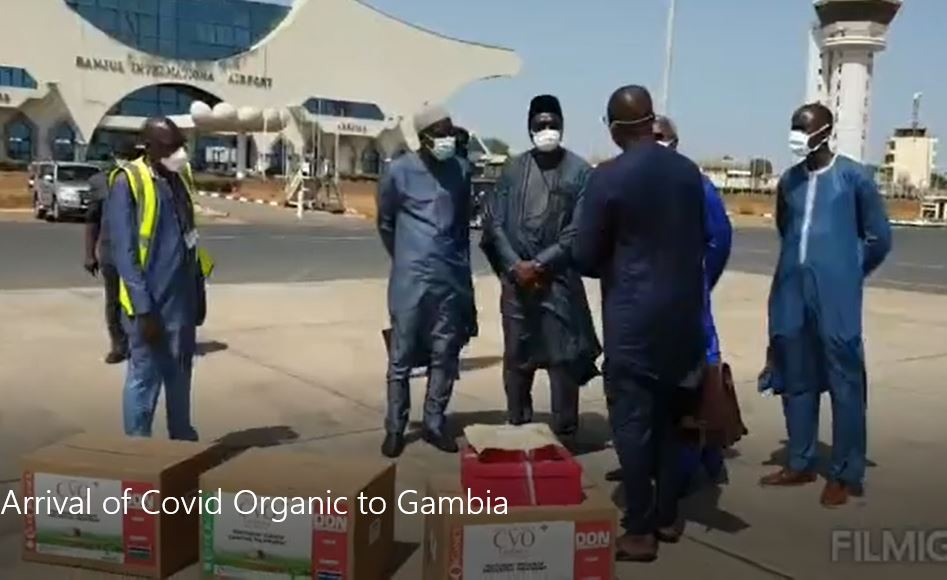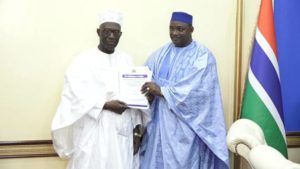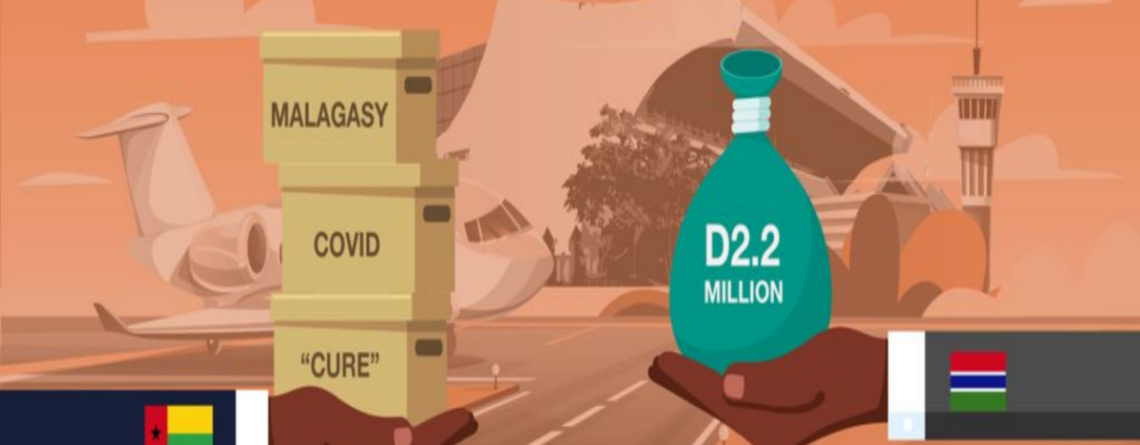Inside Malagasy ‘Miracle Covid Cure’ Donation that Costs Gambia D2.2M.
On a warm Thursday evening in May last year, a private jet lands at the Banjul International Airport. Califa Soares Cassama, the chief of staff of the president of Guinea Bissau, gets off the plane, holding a black handbag on one hand and two red boxes on the other. Twelve steps and he comes face-to-face with some masked up Gambian officials lined up on the tarmac to receive him.
As the men exchange greetings in French, porters brought out three 2.0 Cube boxes from the Cargo Hold. The boxes contain Covid-Organics, a Madagascar-made herbal concoction for Covid-19 ‘prevention and cure’.
The consignment is part of a much bigger package that had arrived in Bissau – from Antananarivo – three days before. The Gambia is one of the 14 African countries that were gifted the cure by Madagascar.
The Gambia’s Foreign Affairs Minister, Dr Mamadou Tangara was at the airport to receive the consignation. With him there was then Gambian Ambassador to Bissau Alieu K. Jammeh and Chief of Protocol at State House Alagie Ceesay. There was one more person on the Bissau side: the Ambassador to The Gambia, Bailo Cassama.
“Bissau took the responsibility of collecting the whole [Covid-Organics] package from Madagascar and redistributing [it] in the region,” Dr Tangara told Malagen.
Moments after delivery of the boxes on the tarmac of the airport, the men emerge from the Terminal building. Ambassador Jammeh is notably missing this time. Cassama waves goodbye as he steps on the stairs of the plane, holding only his black handbag.

The Covid-Organics, as the herbal tonic is called, was announced by Malagasy scientists in May last year. The president of Madagascar Andry Rajoelina had promoted the covid-organics as an ‘African remedy’. He offered to provide it to African countries that ‘showed interest’.
At least two highly placed sources in the government have confirmed that Gambian president Adama Barrow had discussed the issue with his Malagasy counterpart.
What followed was a directive from State House. Seen by Malagen, the presidential directive instructed various offices, including the Ministry of Health and the Accountant General’s Department, to ‘purchase’ the Covid-Organics from the Covid-19 Funds.
The office leading the fight against Covid-19 is the Ministry of Health. However, several officials there said the presidency did not have any proper consultation with the ministry neither the multi-stakeholder Covid-19 coordinating committee.
Dr Abubakarr Jagne is the head of Covid-19 treatment – Covid-19 Case Management. He told Malagen that he had no knowledge the herbal tonic was being brought in. “I just heard it in the news, but we have not been introduced to it,” he says.
The story is similar with the Gambian embassy in Bissau. Alieu K Jammeh, the ambassador at the time, said even though he witnessed the delivery of the boxes, he has no idea about the payment.
He explains: “I was in the Gambia for my annual leave during this period and was only informed by my colleague Ambassador, Guinea Bissau Ambassador in the Gambia, that the Government of the Republic of Guinea Bissau is delivering the covid organic medicine to the Government of the Republic of The Gambia.
Together, we then agreed to witness the delivery and went to the airport but not until I informed my superiors that I will be at the airport for the same.”
The payments appear to violate the law
With the presidency on the steering, the wheels of the government were not moving slow. The transaction was swiftly executed.
“You know the traffic how it is. I received a lot of calls. They were waiting,” Mr Bah says, referring to Gambian officials at the airport waiting for him to deliver the cash for payment.
This was on May 6, 2020. Within hours from when the executive directive was issued, foreign affairs minister Dr Mamadou Tangara, chief of protocol Alagie Ceesay, then ambassador Alieu K Jammeh were all gathered at the airport, waiting for the plane to arrive.
At the same time, the Ministry of Health raised the voucher, the Accountant General processed the payment and Central Bank issued bulk cash of Euros 39,333 (approximately D2.2M) for payment.
“We had the voucher. We had the instruction to pay,” says Mr Bah.
However, the payment was not done as per the instruction, it appears.
“We sent bank transfer details [of Liza the supplier] to them [Accountant General],” PS Jaiteh confirms. When asked why then the payment was done in cash, he responds: “Well, I cannot tell you why they make a cash payment… I cannot be in their mind.”
DAG Bah however insists that making the payment through bank transfer was not possible under the circumstances. He says, “The same instruction that the Health Ministry had was the same instruction that we had to give them the money so that they take it along. If we do bank transfer, those people [Bissau] will not get the money the same day as they arrive and they need proof of payment.”
But could the ‘questionable’ receipt be the only means to get proof of payment? Or, couldn’t bank transfer not provide proof of payment?
“If there is a problem, it is not from my office,” PS Jaiteh was quick to say.
How Central Bank, AGD flout own internal rules
The internal rules of the Central Bank of The Gambia do not allow over-a-counter payment above D100,000 to government’s international clients.
Yet, the apex bank went ahead to pay twenty-two times more than that threshold. The officials of the Bank, including the Governor Buah Saidy and Director of Banking Karamo Jawara, have not responded to several requests by Malagen for explanation to the public.
Similarly, the policies of the Office of the Accountant General prohibit cash payment to international suppliers. Payment is done through Swift Transfer Platform.
Malagen has confirmed that the procurement for the transportation of the consignment did not go through approval by the Gambia Public Procurement Authority.
But the officials at the health ministry hold the position that no rules were broken, claiming that the transaction was conducted during an emergency.
However, the law does not seem to be ambiguous. Section 44 of the GPPA Act states in clear terms that all single sourcing, even based on emergency, shall be approved by the Authority.
And when asked why the decision to bring to Covid-Organics was not subjected to approval of the Covid-19 Committee, PS Jaiteh replied: “How could that have been done under this type of circumstance when we are dealing with an emergency?”
Lessons from the Janneh Commission
The relationship between these two institutions – Central Bank and Accountant General’s office – and the presidency was a subject of intense scrutiny by the Commission of Inquiry into the Assets and Financial Dealings of Former President Yahya Jammeh and close aides. This inquiry reveals how millions of taxpayers’ funds was siphoned off from the Central Bank using presidential directives.

“Banking payment should be reviewed, and controls enhanced. Cash withdrawals should be minimised, and transactions limited to transfers only,” the Janneh Commission recommends.
But this recommendation was disregarded, it appears. Not only did the bank make cash payment but did so to a senior government official in whose name the cheque wasn’t raised.
That was not all. The Janneh Commission warns against using presidential directive to bypass procurement rules. Yet, in this transaction, the executive directive seems to take precedence over the procurement laws.
“For me, the letter [executive directive] was enough to make the payment,” PS Jaiteh says, when pressed on why procurement rules were not followed.
Doubtful payment
With key oversight mechanisms kept out of the loop, established Covid-19 protocols disregarded, procurement rules seemingly violated, questions are now being raised about possible fraud.
At least four senior government officials from various offices, including Finance and State House told Malagen that auditors have queried the payment as ‘doubtful’.
“There is no doubt that the payment could be fraudulent because the way the transaction was conducted is abnormal to say the least,” one of them says under conditions of anonymity, adding “what is more troubling is that the cost did not commensurate the quantity of the items transported.”
The private jet company that transported the boxes from Bissau to Banjul is Liza Transport International. The owner is a Burkinabe businessman Mahamadou Bonkoungou who also owns a construction company, Ebomaf and International Business Bank. He reportedly offers free services to West African leaders, including flying them around for free in exchange for contracts.
Investigations by Malagen indicate even though the voucher was raised as payment for the company, the payment was made to the Bissau official who delivered the boxes, instead of Lisa Transport.
The receipt issued for the transaction is a handwritten document signed by Califa Soares Cassama for Bissau and Musa Bah for The Gambia. The chief of protocol at State House signed off as the witness. But he told Malagen that he did not know how much was paid to Bissau.
Some of the officials involved in the transaction appear to not know that payment was made directly to Liza and that Cassama was an official of the government of Bissau.
“I am hearing that for the first time,” said P.S Jaiteh, when asked whether he knew the cash payment was made to Califa Soares Cassama.
Being the person who signed the voucher, he added: “What I know is that on our document, Liza Transport International appear. If there is anything wrong with it, it is not from this office?
The Deputy Accountant General Musa Bah, who withdrew the cash and claims to have made the payment, also did not seem to know that he was not paying directly to Liza Transport.
“I was not paying Guinea Bissau,” he said when told that the payment was made to a Bissau official.
This is excerpts of conversation between Malagen and Mr Bah:
You have the money to Califa Soares Cassama?
Yes
Soares Cassama is an official of Bissau, working as a close aide to the President. He doesn’t work for Liza.
Ah, he doesn’t work for Liza?
Soares is an official of Bissau, of course.
One thing Sir, they brought Covid Organic, they have evidence of delivery, we have evidence of payment effected and acknowledgement of that payment.
Is it risk worth taking?
The Covid-Organics, an infusion of indigenous Malagasy herbs, was touted as a ‘miracle cure’ for Covid-19, but it has so far failed to produce any miracle in the treatment and cure of Covid-19 even in the country of origin.
The World Health Organisation had warned against the use of the medicine before clinical trials are conducted. One year on, no clinical data is available to support the claim of its efficacy.
However, health officials in The Gambia maintain that bringing the Covid-Organics into the country was a risk worth taking.
“The idea of getting at the time any prospective cure for COVID was to get it early and await the research results to guide usage,” said Dr Mustapha Bittaye, Director of Health Services.
He added: “This was mainly because once it was found as a good cure it would be difficult for a country like ours to lay hands on it. We have done this with many drugs including hydroxy chloroquine, Madagascar, Russian vaccine etc.”
In Madagascar though, there is a health policy U-turn.
President Andry Rajoelina had refused to entertain the use of scientifically proven vaccines and instead promoted the use of the Covid-Organics. But in the face of rising Covid-19 cases in that country in recent months, his country has now joined the COVAX program.
The Gambia has not used the herbal medicine. Dr Babanding Sabally, the director of national pharmaceutical services, told Malagen: “It [Covid-Organic] is here intact, as we received it… As custodians of this, we are keeping it for safe keeping for further directives.”
But with the health policy U-turn in Madagascar, the Organics may continue to sit idly in the stores despite ‘spending’ D2.2 million of taxpayers’ funds even when frontline health officials would soon protest to be paid their hard-earned allowances.

